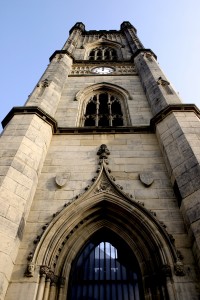 I’ve been spending a lot of time this summer asking myself the question: ‘What would a charismatic and incarnational faith look like?’ On the surface this is an easy question to answer and we could say that the incarnation means that we would be the means through which the power and spirit of God will flow into the world.
I’ve been spending a lot of time this summer asking myself the question: ‘What would a charismatic and incarnational faith look like?’ On the surface this is an easy question to answer and we could say that the incarnation means that we would be the means through which the power and spirit of God will flow into the world.
Yet this doesn’t address one of the key points of struggle I have in general with charismatic theology. This struggle is that the implicit model for understanding the world (and its interaction with the spiritual world) I see most charismatics functioning under the older model where people are pushed around by good/evil spiritual forces from some spiritual realm. I don’t see this as being an incarnational worldview but rather a view that looks to the heavens to explain the actions of the world around us.
Instead I see the incarnational model being one where the God of the Universe actually dwells within us (see Pentecost in Acts 2:1-21) and that it is through this indwelling that God works in the world. We see the spirit of God work through and out of Jesus in his ministry as he preached and healed those he came in contact with.It isn’t that God couldn’t do what he wishes without us, but that God has chosen to empower people with the Spirit of God to do God’s work in the world.
So my question might better be stated through asking how can we hold the reality of God’s incarnation within us as the primary means through which God desires to establish Heaven on earth when charismatic theology general tends to imply that we must call out to a God above who might or might not act? Can we allow space for the miraculous alteration of systems and structures that lift millions out of poverty or sickness? Can there be space for the sweat of God’s people to be seen as an act of God’s power equal with or surpassing healing or deliverance? Or are we content to us God’s power as a shortcut that lets us to not expand our ability to love? How can we affirm suffering, and suffering with others as a blessing (as Christ suffered and so shall we) when we exalt God’s healing and deliverance as the ultimate form of blessing?
The issue is deeper than the means by which God chooses to exercise his power in creation. I believe that if we don’t wrestle with questions like these the charismatic church will simply become a church full of people with similar problems and no diversity as they alienate those whom do not experience the “power” of God as articulated by a few. Then it will simply become a church for some, and not for all (which is my current hope).
If you have any thoughts or additional questions to add please leave them.